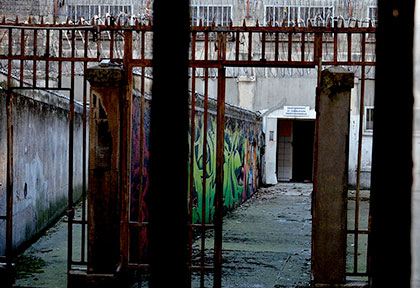
[ABOVE—A prison in Lyon by Philiphotos (Own work) [CC BY-SA 3.0 (http://creativecommons.org/licenses/by-sa/3.0)], via Wikimedia Commons “I, the copyright holder of this work, hereby publish it under the following license: This file is licensed under the Creative Commons Attribution-Share Alike 3.0 Unported license.” File:Prison saint Paul Lyon.jpg]
In 1562 Jean Pierre Chambon found himself in solitary confinement in a dungeon in Lyon, France, for robbery and murder. Chained, hungry, tormented by vermin, he spent his days cursing his existence and the God and the parents who had brought him into being.
History of Christianity is a six part survey designed to stimulate your curiosity by providing glimpses of pivotal events and persons in the spread of the church.
That was a year of severe persecution against Huguenots (Protestant Calvinists). The prison overflowed and Peter Bergier, a Protestant merchant, was placed in Chambon‘s cell. Appaled at Chambon’s continual cursing, he pleaded with him to stop, warning him that curses could not possibly help him, but would heap up more wrath for him when he faced God‘s judgment. Chambon replied that it was true that curses did not bring him any aid, but Bergier’s prayers would bring no help either.
Chambon continued to make prayer as difficult for Bergier as possible, but Bergier, who, unlike his fellow-captive was not chained, responded with kindness, doing for Chambon whatever he could and sharing the food that friends sent him [Bergier] from the city.
As a result, Chambon stopped disturbing Bergier’s prayers and began to listen when Bergier spoke to him of the Word of God and the Savior’s love. The Gospel penetrated his heart and he was transformed. Eventually, Bergier was burned at the stake and Chambon had his arms and legs broken with a heavy wagon wheel. Below is a nineteenth-century account of his conversion, condensed and modernized.
“An Incident in a Prison.” The Christian Treasury, (Edinburgh: Johnstone, Hunter, and co., 1863) 65.
Bergier pointed out to him the mercy of God, who ”wills not the death of the sinner, but that he should turn to him and live.”
“What! Even a murderer?” asked Chambon, with averted face.
“Yes!” replied Bergier, “for thus speaks the Lord by his prophet to those whose hands were full of blood, ‘Wash you, make you clean; put away the evil of your doings from before my eyes; cease to do evil, learn to do well; and though your sins be as scarlet, they shall be white as snow; though they be red like crimson, they shall be as wool.’”
“But what good can I do now,” asked Chambon, “bound and fettered, and appointed to death as I well know myself to be?”
“You can believe God’s declaration,” replied Bergier, “and look to him for the forgiveness of your sins. It was a criminal like you, one nailed hand and foot to the cross, appointed to death, and disabled from living a life of obedience, who said to Jesus, ‘Lord, remember me when you come into your kingdom;’ and to him the Savior gave the comforting assurance, ‘Today you will be with me in Paradise.’ Take that for your example and your justification for asking forgiveness.”
“And do you really believe,” cried Chambon, on whose mind a ray of hope began faintly to dawn, “that I can be saved?”
“Only believe, and you will be saved,” said Bergier, with solemn earnestness; and immediately kneeling down, he began to pray aloud that Jesus Christ would have compassion on the repentant sinner, and give him assurance of his grace. Chambon had fallen on his knees likewise, and with folded hands and trembling voice joined in Bergier’s prayer with the petition, “Lord Jesus! dear Savior, have mercy on me!”
And now, as it was the first time in his life that he had really prayed, so he learned also now for the first time that prayer can help us. Even while he prayed the ray of hope grew brighter in his heart, and the Holy Spirit, who had, by means of the word, had begun the good work in his soul, carried it on by the same instrumentality to the day of redemption.
From that hour Chambon commenced, as he himself afterwards expressed it, a new walk. Openly confessing himself the chief of sinners, bewailing his shameful life and horrid acts, he continued active in prayer to God for mercy and pardon. At the same time he drank in the Scriptures, which Bergier repeated to him, as the thirsty earth drinks in the rain from heaven, until he at length attained to the firm assurance that he, too, all unworthy as he was in himself, had obtained, through the Lord Jesus Christ, “redemption in his blood, even the forgiveness of sins, according to the riches of his grace.”
The lips that had blasphemed now overflowed with thanksgiving and praise for the mercy that had been granted to him.

